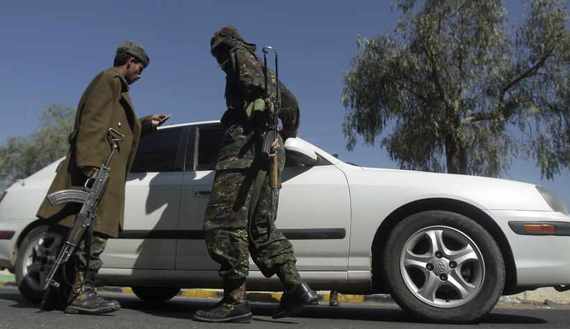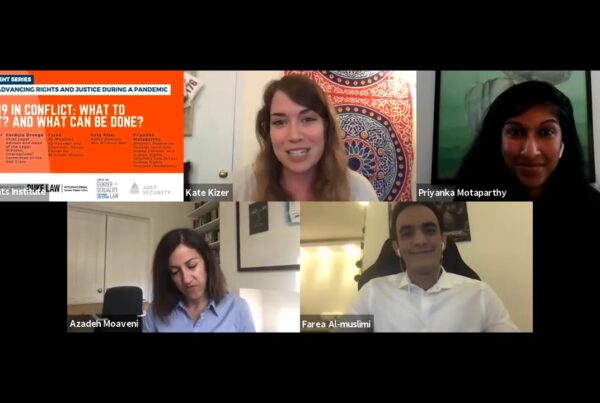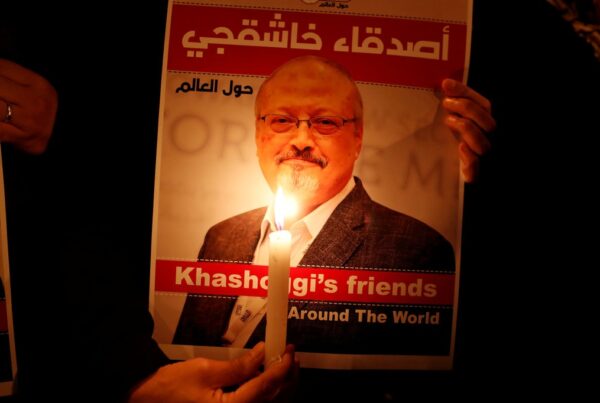In Yemen there’s a joke that in 1994, after the South lost the long civil war, the northern tribes who fought in the war started returning from Aden laden with booty and weapons. So the Yemeni government put up checkpoints to confiscate these weapons. At one checkpoint, a soldier with a Kalashnikov rifle was standing guard and, like any other soldier, was stopping the passing cars to inspect them for weapons. Then someone driving a tank, which he had taken as booty from the battlefield, stopped at the checkpoint. The soldier looked at the huge tank and at his own small rifle, and asked the tank driver whether he was carrying any weapons. The driver said no and was allowed to pass.
Driving in Yemen these days, one may suddenly come across barrels in the middle of a road linking two Yemeni cities, with tribal gunmen ordering the car to stop, despite the military checkpoint just passed.
The roads between and within Yemeni provinces are not smooth. Anyone can put up a speed bump on a main road to draw attention to his store or to fruits for sale at harvest time. The authorities do not interfere because they don’t consider the matter serious, despite those speed bumps causing thousands of accidents each year.
What’s more dangerous and organized are the checkpoints set up by tribal gunmen for ideological or criminal reasons, to protect the road or to keep tabs on from where the travelers come so that they can be taken hostage and used as pawns in local disputes, or for affecting the negotiations between quarreling parties.
The Yemenis have given two different names to the armed checkpoints on public roads between cities. A checkpoint for the purpose of robbery or murder is called a taqattoh checkpoint, because it is manned by criminals. The checkpoint for the purpose of kidnapping inhabitants of rival areas is dubbed a quttaa checkpoint, and is considered less criminal than taqattoh because travelers are not killed or robbed. I always find it difficult to explain the differences between these terms in a foreign language or to a foreign visitor to Yemen.
Various demands
When passing through a government security checkpoint, the soldier glances at the car and its occupants and then signals the driver to proceed. He may search the car by opening its doors or, rarely, by searching the bags of its occupants.
For the past two years, a driver can no longer completely trust someone wearing a military uniform asking him to stop for a search. The security services have uncovered several checkpoints inside cities and at their exits that were manned by gunmen dressed in official security uniforms but were in fact a criminal taqattoh gang that robs travelers. The security services discovered this tactic being used by criminal gangs only after multiple complaints by citizens who have been robbed, as happened in the capital Sanaa and in Taiz.
Naturally, arms are plentiful in Yemen, and there is no problem for those who have money to get them, for as little as $1,000. The professional and technical weaknesses of the security services compound the problem.
The security checkpoints seldom ask for personal identity cards. But when a car comes across a quttaa checkpoint of armed tribesmen, an identity card is the only thing that can save the driver from kidnapping, or at least delay it, because the card shows where he is from and thus reveals whether he is an opponent wanted by the enemy tribe or an ordinary citizen that has nothing to do with the gunmen’s problems.
Contrary to quttaa, taqattoh checkpoints mostly appear at night and are typically not set up close to security checkpoints. They are also rare, and generally remain undiscovered by security forces until after several crimes have occurred. Fortunately, they are less prevalent on travel routes and those manning them do not care about the driver’s or passenger’s identity, but only how much money they have. Rich Yemenis rarely travel like ordinary citizens.
The “we are here” checkpoints
In the northern provinces of North Yemen (Saada, Amran, Hajjah and Sanaa), there are other types of armed nongovernmental checkpoints. Those checkpoints are mostly for the Houthis, and those manning the checkpoint are locally called mujahedeen, regardless of their motive. They deal nicely with those passing through if they are from outside the region. Their tribal opponents also have similar checkpoints, and all are looking for each other more than anything or anyone else.
If a driver reports a quttaa checkpoint manned by tribal gunmen to the nearest army checkpoint, the soldiers will give him details about it, the tribal sheikh it belongs to and what it is doing in the area. They will thank him for his concern. Then they will proceed to inspect the cars and let them pass toward the quttaa checkpoint without the slightest warning about what the drivers will run into there.
These checkpoints are often dismantled after tribal mediations resolve the dispute between the tribes of the kidnappers and of the captives. The state either remains quiet or supports the resolution. It rarely interferes, as happened in Sanaa province in coordination with the leadership of the province to hunt down quttaa gunmen.
For those who subscribe to a government news service via mobile phone, one of the most frequent messages they will receive is news that “Security units have shut down a tribal quttaa checkpoint,” or that “A transport carrying natural gas was hijacked by tribal quttaa gunmen and liberated by the army.” The state is not the least bit embarrassed to provide such security news.
This Yemeni phenomenon is in no way new. It is a legacy of the many local wars during the last half century. In the past two years, however, the checkpoints have become more frequent because of the weakness of the state and because some politicians want to weaken it further. In other words, that phenomenon is both a cause and a consequence of the weakness of the state, especially regarding arms smuggling to Yemen. The smugglers need to get through the security checkpoints and thus coordinate with corrupt soldiers at the official checkpoints.
The overlap of the country’s issues is mixing politics with smuggling, searching with taqattoh, security with politics and the economy with all of them.
On some long roads between two Yemeni cities, you have to add at least a third of the driving time to deal with the security checkpoints, the tribal quttaa checkpoints, the concrete and dirt bumps and the auto-repair shops on both sides of the road.
Despite their frequency and diversity, all official or tribal checkpoints, without exception, have one thing in common: They almost never stop or search a car transporting a woman.
When traveling in Yemen, having a woman in the car is a passport through these checkpoints, for rapid passage without having to stop to have one’s identity or car inspected. According to Yemeni custom, it is shameful to stop women or those accompanying them.
In Yemen, customs and traditions are present even at hostile checkpoints.








